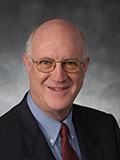Steve Crocker

Crocker received his bachelor’s degree in 1968 and his PhD in 1977 from UCLA. He grew up in Pasadena, CA and was a “high school buddy” with Vint Cerf; a friendship that continued through the University of California, Los Angeles (UCLA), where they both earned their PhD’s in computer science albeit years apart. Crocker confesses he “limped through school” in contrast to the more disciplined Cerf. Nevertheless, Crocker possessed a rare degree of self-assuredness and was willing to make trade-offs to keep the focus of his education on his primary interests. For example, had he graduated on time, he would have earned his bachelor’s degree in 1965, but it took him until ‘68, in large measure because of his desire to explore the best program of study in Artificial Intelligence. Leaving UCLA before earning his degree, he took time to study at MIT in ’67. While at MIT, he asked Cerf, who was then in graduate school at UCLA, to find him a job in Los Angeles for the summer of 1968. Cerf connected him with Estrin, who Crocker had worked with as an undergraduate. It didn’t take Crocker long to decide to remain at UCLA to finish his degree.
When ARPA held their Principal Investigators’ meeting in the spring of 1968, Crocker attended as a representative of MIT. Then in July, when Elmer Shapiro of SRI held the first meeting of the initial four sites to receive IMPs, Crocker attended as a representative of UCLA. Crocker and his fellow students relished the chance to connect with other bright minds in computer science. Another meeting of graduate students was suggested by Daniel Slotnick and took place later that year at the University of Illinois. Motivated to address the challenges they were facing, and partly, in Crocker’s words, as a “boondoggling mechanism”, Crocker and other students tasked with connecting their host computers to the first nodes of the Arpanet began meeting regularly at each of the four sites. The group became known as the Network Working Group (NWG) – one of the important informal structures of the Arpanet culture. Crocker and the group initially assumed their questions would be answered by superiors at ARPA and BBN, however such supervision rarely materialized. It was Crocker who realized the need to document these meetings and tasked himself with writing down the issues and proposals the group had discussed. Crocker’s first Request for Comment (RFC) was sent out on April 7, 1969. He continued to edit and distribute these important summaries of the group’s work until he accepted a position with ARPA in early 1970, at which time he handed over the editorship to fellow UCLA grad student, Jon Postel.
Steve Crocker’s Interview is lengthy as he discusses a number of valuable subjects in addition to his own very important role in the coming into being of the Arpanet. So if you are interested in the greater role of ARPA and its function, and not just the Information Processing Techniques Office (IPTO); the early history of computers at the UCLA; how NWG formed; the inception of the RFC; Crocker’s views on the importance of networking versus computer science; or, in general, the emerging culture of the early history of computer networking and Arpanet; reading this Interview will provide frank, fresh and fun insights. I hope you will agree.
Keywords: Arpanet; Network Working Group; Request for Comments; UCLA; MIT; ARPA